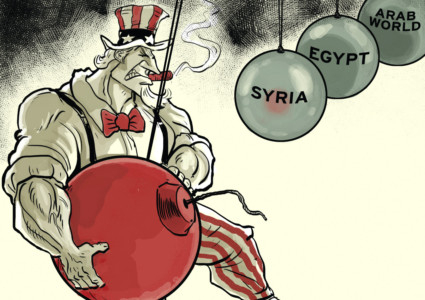
The question of the national state in the Arab world and its fate — after the weakening of Iraq, Libya and other Arab countries — is one of the most important ones today. And the question seems even more significant when it comes to Egypt.
Hence, Egypt, which lived through a violent struggle for existence as a state after June 30, and is still undergoing a war of attrition waged by the Muslim Brotherhood, is not the same as before, in comparison to Syria.
The western intervention in Syria was meant to be similar to that in Iraq and Libya — built on lies and excuses to market the war. Syria and Iraq suffer a similar fate today, following 10 years of destruction of Iraq, which was accused of owning weapons of mass destruction. This was used as a pretext for war by the West.
Had war been launched on Syria, it was only to be expected that the final aim would have been to topple the state and its social structure in a manner similar to what happened in Iraq. There is a difference between a political system and the state’s structure and its entity. However, the recent western wars in the Arab world have erased this difference and have gone beyond overt targets of punishing regimes to toppling the Arab national state that was established after the colonial era.
The collapse of the state in Iraq was a huge occurrence, after which the country became a failed state and an arena for militia-style clashes, sectarianism and tribalism. The US war on Iraq killed hundreds of thousands of people and destroyed the country. Moreover, the destruction of the state’s structure guaranteed the emergence of a killing machine that produced more victims and deaths even after the US forces pulled out of Iraq. These killings are very likely to continue for an indefinite period.
The collapse of the state in Iraq and Libya, not to mention the weakening of it in other Arab countries, is telling of the difference between civilisation and barbarism, security and the lack of it, education and illiteracy and health and sickness. This is not to compliment dictatorships, but a rejection of foreign aggression and its tendency to reverse the meaning of civilisation. Against this backdrop, talk of foreign intervention in Syria means destruction is a continuing western project. In case of a war, the space for destruction and chaos will expand in the region.
This discussion has its special resonance in Egypt, where the internal political struggle revolves around the state, where the overt government project is to maintain and protect it against the Muslim Brotherhood’s threats and to restore its authority. The official Egyptian stance of refusing military intervention in Syria reflects the tension existing in relations with the West after the political transformation. The West showed negative attitude towards the Egyptian state for having regained its strength and trying to create a new spirit of national solidarity. Thus it described what happened in Egypt as a military coup. The Egyptian media, on the other hand, talks in an almost single voice about the West’s efforts to offset the Egyptian national project to bring back the state into the spheres of political, diplomatic, media and economic strength.
This is also the concurrence between the Muslim Brotherhood and the West to exhaust the Egyptian state and lead it towards failure by ensuing economic paralysis and disabling people’s daily lives. There are always complaints regarding foreign intervention in Egypt’s internal affairs made by Egyptian officials and political leaders.
The last of these objections was made by Adly Mansour, Egypt’s interim leader, who expressed the people’s disenchantment with the West’s regional agents and the media campaigns focused on Egypt, run by Qatar and Turkey. A general Egyptian awareness has crystallised regarding the originally planned intervention in Syria. This awareness links the events in Syria with the future of Egypt. People are also sceptical about the goals and western colonial intentions.
Hence, the Egyptian foreign ministry took an independent stance, the likes of which have not been seen for a long time. This was seen when Nabeel Fahmi, Egypt’s Foreign Minister, pointed out Egypt’s refusal to accept foreign intervention in Arab affairs during the Arab League conference on Syria. He also said that Arab issues will have to be solved by Arabs themselves.
This is completely different from former Egyptian president Mohammad Mursi’s policy towards Syria, which was widely believed to be the reason behind the Egyptian army’s position against him and the backing of the people in their demands to oust him. An important strategic fact comes to mind: The Egyptian army is the last big Arab army that exists today! Another fact which is being heard in Egypt is that Syria is the ‘strategic’ depth for Egypt and its security. There is also justified scepticism that striking Syria is meant to be a blow directed at Egypt.
Therefore, Egypt is also a target along with Syria in the war and there is concern regarding the fate of the state and what comes after that.
Dr Amina Abu Shihab is an Emirati social anthropologist.









